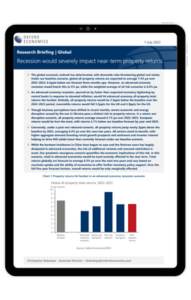Recession would severely impact near-term property returns

The global economic outlook has shifted drastically in the three months since our last global real estate scenario research briefing. The war in Ukraine introduced a significant amount of uncertainty into geopolitics and the outlook for the global economy, with downside risks accumulating since then. Over the past few months, we’ve gradually downgraded our global economic growth forecast, while upward revisions to the global inflation forecasts have seemingly been unremittent. Our most recent June flash Global Risk Survey suggests a shift in business perceptions about the key risks to the global economic outlook. While still pervasive, the war in Ukraine is no longer the prime concern of the Oxford Economics’ clients canvassed. Instead, it’s been supplanted in the latest survey by the risk of an advanced economy recession, on the back of quickening central bank tightening (Chart 2).
What you will learn:
-
The global economic outlook has deteriorated, with downside risks threatening global real estate. Under our baseline scenario, global all-property returns are expected to average 7.4% pa over 2022-2023, 0.2ppts below our forecast three months ago. However, an advanced economy recession would knock this to 5% pa, while the weighted average of all risk scenarios is 6.6% pa.
-
An advanced economy recession, spurred on by faster-than-expected monetary tightening by central banks in response to elevated inflation, would hit advanced economy all-property total returns the hardest. Globally, all-property returns would be 2.5ppts below the baseline over the 2022-2023 period, meanwhile returns would fall 3.5ppts for the UK and 2.9ppts for the US.
-
Though business perceptions have shifted in recent months, severe economic and energy disruption caused by the war in Ukraine pose a distinct risk to property returns. In a severe war disruption scenario, all-property returns average around 6.1% pa over 2022-2023. European returns would be hurt the most, with returns 3.1% below our baseline forecast by year-end 2023.
Tags:
Related posts

Post
No major shocks in the New South Wales Budget in Australia
Discover the key highlights of the 2025/26 NSW Budget, including extended land tax concessions for build-to-rent and funding for major infrastructure developments.
Find Out More
Post
Tariff effects are starting to show
The scale of the US tariffs announced on April 2 suggests the economic impact on the Eurozone will be swift. Indeed, a range of high-frequency alternative data plus more timely surveys are already indicating early signs of the reaction to the tariff hit.
Find Out More
Post
Housing policy outlook clears after Federal Election in Australia
Saturday's Federal Election decisively delivered a second term for the Albanese government, clearing up the policy outlook.
Find Out More